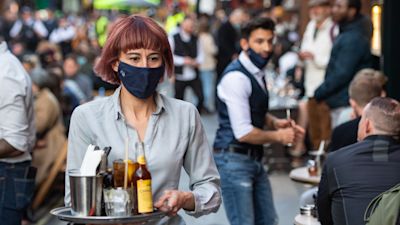Insight
Inflation remains high and is set to get higher as hotels and restaurants warn costs are rampant

Christmas is coming but now is a challenging time to be selling toys as shipping costs for containers have surged by about six-fold, ITV News Business Editor Joel Hills reports
Prices rise, it’s a fact of life. The Bank of England’s job is to ensure that the pace at which they rise remains low and stable. The Bank targets an annual inflation rate of 2%. Last month CPI inflation eased slightly to 3.1% but remained well above target. “The lull before the storm,” decides Capital Economics, pointing out that the impact of the surge in gas and electricity bills and the reversal of the VAT reduction for hospitality and tourism businesses have yet to be felt. Meanwhile, supply chains globally remain over-stretched.
The headline rate of inflation in September was driven higher by the price of air fares, games and toys, second hand cars, and the price of petrol and diesel in particular. The average petrol price during September was 134.9 pence a litre, up from 113.3 pence the year before. Pump prices have risen again since. High inflation causes significant difficulties. It squeezes the living standards of families - hurting those on the lowest incomes the most - and it squeezes the profits of companies. Some are feeling it more than others. The Office for National Statistics (ONS) calculates that prices in hotels and restaurants in September were 5.1% higher than a year ago. The sector says there are more price rises to come because their costs are still heading north.
Kate Nicholls, the CEO of UKHospitality describes a "toxic cocktail of costs" hitting the industry
Hospitality UK calculates that cost price inflation across its members’ businesses was running at an annual rate of between 13% and 15% at the end of September. Wage bills are up (11% to 13%) due to a shortage of staff, the price of food and drink is up (9% to 11%) due to the supply chain problems and energy bills have, in some cases, almost doubled (businesses are not protected by regulator Ofgem’s price cap) on the back of the wholesale price of gas and electricity. “It’s bad now and it will get worse,” says Kate Nicholls, the chief executive of UKHospitality.
“An inflationary bubble is building, it will soon burst and consumers will see significantly higher prices in pubs, bars and hotels.
“Businesses [in this sector] have never been in such a severe situation. They are seeing prices rising across all costs lines. The problems is a lack of resilience, companies took on debt to survive lockdowns, they don’t have cash reserves, there’s no room for manoeuvre”. Pockets of pressure have built elsewhere in the economy too.
Ms Nicholls urges the government not to increase VAT back up to 20% next March
Input price inflation (the cost of raw materials) for manufacturers reached 11.4% in September - the highest level for 10 years. There are signs these costs are now being passed on to consumers.
The last thing indebted businesses want to see is a rise in the cost of borrowing but that is now looking more likely. Until now, the Bank of England’s assessment has been that this period of high inflation will prove temporary, but at the weekend the governor, Andrew Bailey, suggested interest rates may rise soon.
Markets expect that Bank Rate - currently 0.1% - will have reached 1% by next August. Investors are betting on a 0.15% increase at the Monetary Policy Committee’s next meeting in November. Raising interest rates will not conjure up more HGV drivers, nor will it increase the production of semiconductors, reduce shipping costs or drive down the market price of oil and gas. It will further squeeze the living standards of some and slow growth generally but the Bank seems to think that might be a price worth paying to ensure inflation expectations remain anchored.